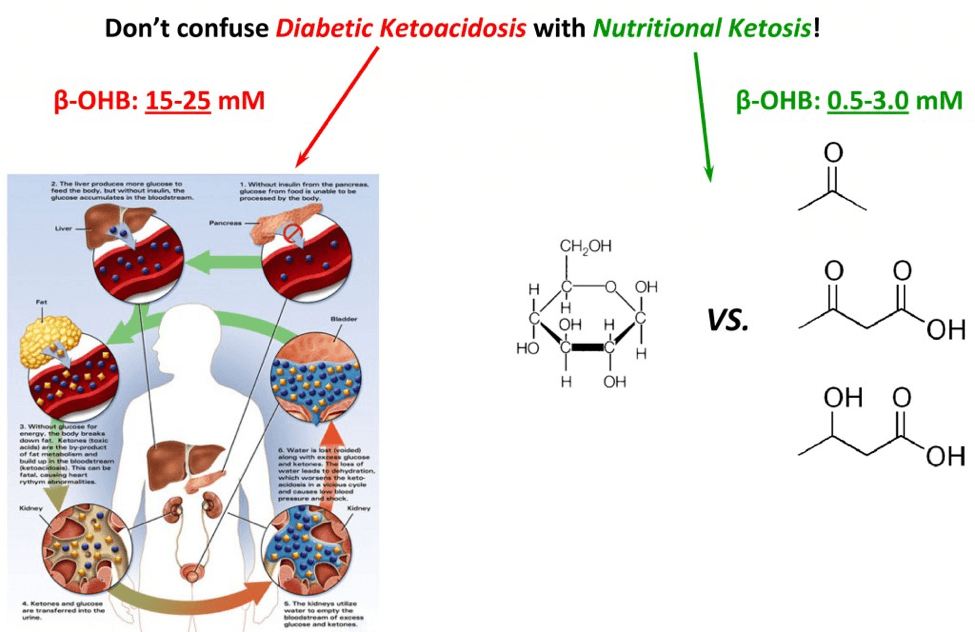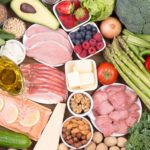You may have heard from your doctor that ketosis is a life-threatening condition. If so, your doctor is confusing diabetic ketoacidosis (DKA) with nutritional ketosis, or keto-adaptation.
First, some semantics. Our body can produce, from fat and some amino acids, three ketone bodies (a “ketone” refers to the chemical structure where oxygen is double-bonded to carbon sandwiched between at least 2 other carbons). These ketone bodies we produce are: acetone, acetoacetone, and beta-hydroxybutyrate (B-OHB). [For anyone who is interested, they are the 3 most right structures on the figure, below.]
Why do we make ketones? For starters, it’s a vital evolutionary advantage. Our brain can only function with glucose and ketones. Since we can’t store more than about 24 hours’ worth of glucose, we would all die of hypoglycemia if ever forced to fast for more than a day. Fortunately, our liver can take fat and select amino acids (the building blocks of proteins) and turn them into ketones, first and foremost to feed our brains. Hence, our body’s ability to produce ketones is required for basic survival.
What is diabetic ketoacidosis? When diabetics (usually Type I diabetics, but sometimes this occurs in very late-stage, insulin-dependent, Type II diabetics) fail to receive enough insulin, they go into an effective state of starvation. While they may have all the glucose in the world in their bloodstream, without insulin, they can’t get any into their cells. Hence, they are effectively going into starvation. The body does what it would do in anyone – it starts to make ketones out of fat and proteins. Here’s the problem: the diabetic patient in this case can’t produce any insulin, so there is no feedback loop and they continue to produce more and more ketones without stopping. By the time ketone levels (specifically, beta-hydroxybutyrate) approach 15 to 25 mM, the resulting pH imbalance leads to profound metabolic derangement and the patient is critically ill.
But this state of metabolic derangement is not actually possible in a person who can produce insulin, even in small amounts. The reason is that a feedback loop prevents the ketone level from getting high enough to cause the change in pH that leads to the cascade of bad problems. A person who is said to be “keto-adapted,” or in a state of nutritional ketosis, generally has beta-hydroxybutyrate levels between about 0.5 and 3.0 mM. This is far less than the levels required to cause harm through acid-base abnormalities.
Keto-adaption is a state, achieved through significant reduction of carbohydrate intake (typically to less than 50 grams per day) and moderate protein, where the body changes from relying on glycogen as its main source of energy to relying on fat. Specifically, the brain shifts from being primarily dependent on glucose, to being primarily dependent on beta-hydroxybutyrate. This has nothing to do with what a diabetic patient is experiencing in DKA, but does illustrate how poorly informed and quick to react the medical community is. DKA and nutritional ketosis (or keto-adaptation) have as much in common as a house fire and a fireplace.
Photo by Andrew Yardley on Unsplash








thanks for all your amazing info!!
i wanted to know if you can point me tp some rsearch i can do on the debate of the effect of very low carb on thyroid health and the effect of t3 on ldl-c
Any diet that results in meaningful weight loss (more than 7-10% of body weight) will tend to push up reverse T3. This will soon be shown (i.e., in press) to be reversible with T3 administration.
I am a nursing student and am considering doing my senior thesis on nutritional ketosis . I was discussing it with a respiratory therapist who brought up kidney damage and bone loss due to calcium depletion due to an over production of stomach acid as reasons not to be keto-adapted long term. I thought I had heard most of the nay saying but this was new to me. Is this a standard response or is this a potential truth that comes from issues of potential electrolyte imbalance. I found your page while looking for an answer.
Kidney damage is a myth, but bone loss is possible if the diet isn’t balanced. Easy to correct with supplementation.
Hi Dr. Attia,
I’m so glad I found this blog very interesting! I began a low carb lower sugar diet about 15 days ago. My carb intake has ranged from 42-62grams/day and I cut it fruit with the exception of a small Apple everyday. I have lost 7 1/2 lbs. feel great but I am concerned the more people tel me about the dangers of ketosiis… I’m not a diabetic but my breath did all of sudden start smelling and yesterday and I got concerned because I read hat was a trigger….. I would like to stay on this low carb for a bit longer but not sure if I am in that dan fourths state. Any advice would be appreciated 🙂
Vr,
Andrea
Hi! Due to my allergies I can’t eat most carbs, grains, fruits etc., so for about 6months I’v been gradually reducing carbs in favour of protein and fat, but eating loads of vegetables – I suspect I might eat 30-50g of carbs pe day last 3 months, I felt grate, I did a lot but moderete excersises, lost 5kg in last 2 months so my bmi is 20now. When I started running daily 2 weeks ago, with increasing performance I felt a bit of hadache, maybe slight dizzynes and a state of “high”- slighty shaky hands, trouble to sit still, to fel asleep, but not much apetite – so despite running I didn’t eat more than before, to be honest I didn’t drink more either cause I didn’t have more thirst and the urine colour was ok. I bought urine ketone strips and the colour was deepest purple, almost darker than the skale, it was 2 days ago, since then I rest (although I don’t feel bad), drink more (pee a lot) and added some potatoes to my meals and honey to my tea, stil Il can’t get out of pink zone, in the evening it goes back to purple but not so deep as first day. How to stop/reduce ketosis safely? I’ve read that even slight increase of carbs kicks out of ketosis instantly but it does not happen, I’ve never been diabetic, my last blood glucose levels were 86 in the morning and 70 in the afternoon (couple of weeks ago). My pulse is usually 60, but maybe due to nervouses (a lot of reading about how my urine ketones should be none or very low) was up to 70 for past 2 days, returned to normal today. Is/was it dengerous state? Is it possible I need more carbs than 50g? I weight 54kg, female, about 20% of fat so not overly skinny.
Hello,
I started the keto-diet a month ago to see how my body would react. As suspected as me and my body gets used to this way of eating there have been ups and downs. However, one question I have for you is I am not going about this the typical high meat way. I am going about this diet in a 90% plant based way. I do eat eggs each morning w/ goat cheese, but thats about is as far as animal fats go. With that, have you found any successful studies of living the keto lifestyle using plant-based foods?
I would add butter and cold water fatty fish and in my opinion it can be healthy long term diet.
I am on keto diet and IF around 3-4 years and also not a big meat eat but eat a lot fish
Hello Peter,
I had a coincidental stumble upon and a subsequent surge of interest in Ketosis/ketogenic diet yesterday. Total dork session ensued.
I put off my morning run, and breakfast, until about 1230pm yesterday. Never ever do I do that. I do fasted cardio MAD early in the AM. While running I noted to myself I could “Forrest Gump” this run, I felt like I could “just keep running” at my 65%+ pace, I felt great. I honestly felt I could have ran double my mileage without thinking.
When I came back from my run, I saw an email from Tim Ferriss open, and the title was about Ketosis, Fasting and athletic performance. I obviously had just experienced all of this and went down the damn rabbit hole.
I spent all night last night and most of the morning today navigating the Eating Academy website and the whole inter-webs and have one question:
How in the actual f*ck do I do this? (I’m pretty ‘hangry’ right now) Im kidding, but really. This is so comprehensive, and so dense, and so laden with links and mazes I cant actually begin mapping a routine/eating habit to loosely begin hypothesizing and experimenting. I do not have the means to begin monitoring/testing my blood, or BMI tests, I can only base my experiments off of feeling.
Is there a ‘Tim Ferriss’ esque Ketosis hack that roadmaps this wealth of knowledge anywhere?
Thank you. The breadth and depth of your work is astounding.
Kind Regards,
Garrett
Hi, any resources on the specific biochemical feedback loop that is non-functioning in a DKA patient? A text book or such? Any leads would be greatly appreciated!
Hi Dr Attia,
I have been on slow carbs since August 1,2015 and lost close to 40 pounds in 5 months. No grains, lots of non starchy vegetables, nuts/seeds, diary and fruits. Started Ketodiet around Jan 10,2016 and within a week started getting rashes in multiple sites with astounding symmetry . Both forearms, both wrists and both arm pits towards the shoulder blade and spreading downwards at exactly the same pace. Doesn’t itch much except during sleep deprived mornings. Any suggestions? The material on this seems to be surprisingly sparse with no definitive reason as to why some people get it while others don’t. Incidentally I haven’t yet started measuring ketones but my post prandial blood sugar is typically under 100 and fasting between 71 to 80. Thanks in Advance, Srini(India)
Are you consuming a lot of high histamine foods? Often what happens when one goes LCHF, is they remove the carbs and replace them with high histamine foods (fermented foods, aged foods, etc). If that’s your case, try that and see if it clears up. Taking an OTC antihistamine to see if that relieves it might be worth experimenting with. Turns out that I and many others in my family are high histamine types to begin with. Google histamine intolerance and you’ll find a bunch of info.
Dr. Attia,
I am on ketogenic diet because of SIBO (small intestine bacterial overgrowth). my betahydroxi butyrate is 22 mg/dL which is high. All my other blood values (BMP,kidney, liver ,glucose are ok; cholesterol and LDL still highs before ketogenic diet). What are the worries? I can’t get an answer from my PCP, a book by a Dr on ketogenic diet says it is ok, on line searches are inconclusive. According to these values and my symptoms (feeling normal). I am not in ketoacidosis which is dangerous, but I am just in ketosis. Is this dangerous? What are the potential negative effects of high beta hydroxide butyrate in the presence of normal values for all other important parameters.Can you underscore your answer with a reference? Thanks!
Check out the book by Travis Christofferson, “Tripping Over The Truth.” Keytosis is a very important for health and longevity.
Dr. Mary
Hi Peter,
I’m just reading a fascinating book about the capacity of our brains. It hypothesizes that we are in the main left neocortex dominant, and much of the right side is under utilized. The authors hypothesize that the brain functions best on sugars and that plant hormones from fruits helped in our intelligent evolutionary leap. I have more esoteric views on that part of their theory, but I wont bore you with that. I think they are right about right brain suppression, but I suspect that more right brain access may be achieved through ketosis?? Your thoughts??
Book – Return to the brain of eden ( https://www.amazon.com/Return-Brain-Eden-Neurochemistry-Consciousness/dp/1620552515 )
Kind regards Paul
This is day 4 of eating LCHF. Generally feel pretty good. Take blood glucose 2 hours after dinner and it is 107. Take blood glucose first thing in the morning and for the last two days it has been 125 and 129. Wondering why blood sugar goes up at night. Urine test of ketones in the morning shows moderate levels. I’m type 2, went off 500 mg metformin xr 5 days ago. Have no gall bladder. Your help is very much appreciated. I don’t know if I am doing something wrong or if this will correct on it’s own. I have had an impossible time finding a doctor in Salt Lake that doesn’t yell at me and tell me I am going to kill myself with this plan. Doctors just don’t understand ketoacidosis.
Eating 4 oz of protein 3 times a day, 2 cups of vegies a day and lots of butter and coconut oil. Again, thank you for any insight into what is going on with me.
For the last two days my BG 2 hours after eating is 149. It goes down during the day and 2 hours after dinner is 107. I am very confused.
Thanks for the info. I’m doing research for information (ketosis, ketogentic diet, etc.) I’m posting on my product website and this is one of the topics. I definitely would like to link to this as a resource. Plus, my mom is diabetic and exploring options for her to talk to her doctor with.
Since I started the LCHF diet (4 months ago), my heart rate during exercise had increased significantly. Even more interesting, for awhile now, before exercise my sugar and ketone levels are:
BS – 75-95
Ketones – 0.3-0.5
After exercise BS jumps even though I did not have any food for at least 10hrs (the day before)
BS – 130-170
Ketones – 0.5-1.2
Why is the sugar going so high? It eventually goes down after 1-2 hrs. Obviously it is entirely secreted by the liver. Why is the glucose not absorbed by the cells?
How could it explain the significant elevated heart rate (170-190 vs. 140-160)?
At the beginning of my diet I was still having good amount of carbs so probably not in ketosis and I felt better and stronger than ever. After tightening the belt it seems to go the other way… I’m not sure what is going on (I’m not diabetic)…
Hi Dr Attia,
I am an internist ( M.D.) from Las Vegas. I am on the Keto diet as well as some of my staff in the office. I have been prescribing this to my Obese and/or Diabetic type 2 patients.
My question is : What about the increase in METHYLGLYOXAL ? Is this a concern to you? The books by Dr Phinney and Dr Volek didnt mention about Methylglyoxal. NEJM study indicate a 1.6 x rise in MG on Atkin’s diet.
Please advise.
Is it relevant?
I am looking for other long term studies on METHYLGLYOXAL ( MG) but couldnt find any as of yet except for the NEJM. MG increased cell apoptosis on mice pancreas and as of yet I have not seen any human studies.
***************************
Ketosis leads to increased methylglyoxal production on the Atkins diet.
Beisswenger BG1, Delucia EM, Lapoint N, Sanford RJ, Beisswenger PJ.
Ann N Y Acad Sci. 2005 Jun;1043:201-10.
Abstract
In the popular and widely used Atkins diet, the body burns fat as its main fuel. This process produces ketosis and hence increased levels of beta-hydroxybutyrate (BOB) acetoacetate (AcAc) and its by-products acetone and acetol. These products are potential precursors of the glycotoxin methylglyoxal. Since methylglyoxal and its byproducts are recognized as a significant cause of blood vessel and tissue damage, we measured methylglyoxal, acetone, and acetol in subjects on the Atkins diet. We found that by 14-28 days, methylghyoxal levels rose 1.67-fold (P = 0.039) and acetol and acetone levels increased 2.7- and 6.12-fold, respectively (P = 0.012 and 0.028). Samples from subjects with ketosis showed even greater increases in methylglyoxal (2.12-fold), as well as acetol and acetone, which increased 4.19- and 7.9-fold, respectively; while no changes were seen in samples from noncompliant, nonketotic subjects. The increase in methylglyoxal implies that potential tissue and vascular damage can occur on the Atkins diet and should be considered when choosing a weight-loss program.
I would need some (read: a lot more than this) convincing that this is worth paying attention to.
I know where you’re coming from that is why we need to check more studies. I am searching on pubmed for more studies. However, MGO is a good counter argument for the ketogenic diet. However, if an astute patient or another doctor ask me about it, my response to them is : MGO is synthesized not only with Ketone metabolism, it is also produced by Glycolysis. The MGO produced serves as negative feedback for Glycolysis.
I have been getting success with Ketogenic diet . I am concerned the MGO debate that is not resolved. No studies that I can see. Perhaps you can design a study on this.
MGO is neutralized by the Gluthatione- Glyoxalase system. With the moderate protein intake with ketogenic diet, will this diet be able to sustain enough amino acids for GSH synthesis?
There are a lot of MGO entries on Pubmed. I encourage you to read them and share it in your blog because this is a good talking point for ketogenic diet.
Thanks.
I probably wan’t clear enough. I’m not disputing the observation, but the challenge (at the risk of stating the obvious) is in determining if it matters. If eating a certain way makes a person’t hair more or less likely to curl, I’m not sure it matters even if documented rigorously. The dose of MGO may be too small to matter. I don’t consider this a strong reason to avoid KD, yet.
Exactly! That’s why more studies are needed to determine if a 2.12 fold increase in MGO has an effect in cellular systems.
I have done my somewhat best at a 100% keto diet for 2 months (protein may reach 30% rarely), and for the past 2-3 weeks I have suffered from terrible stomach cramps. Whenever I have a meal of 90% fat the pain comes in and will even ache my lower back. Pain usually last for 3-4 hours. I supplemented a probiotic and it helped a little but I am still getting the pain.
Hi Peter,
Thank you very much for sharing information.
I have a question: is the ketogenic diet the risk of heart disease sufferers?
Hi Peter.
I’ve been doing a kd for over a week now and my ketostix reading has been a consistent 8mmol from urine.
I have never been diagnosed with diabetes and my blood sugar prior has always been at the low end of normal. Recently prior to the kd I checked blood glucose 2 hours after a big meal and the rise in the glucose was still within normal parameters and less than the average graph figures.
I don’t think I have any problems but I’m worried about the high ketostix reading .
Can you let me know your thoughts please ?
Thanks
Is the INSULIN RESISTANCE brought about by a ketogenic diet dangerous? Does it lead to the same complications (micro and macrovascular) of diabetes type 2?The studies out there are animal studies. There is one study on humans with only 3 subjects and it was only done for 11 days–still showed insulin resistance . Perhaps you know of studies that I’m not aware of? Anecdotal reports show some normal non diabetics having an elevated FBS of 150 and post KD prandial of 250. Isn’t this concerning? How do you screen for people like this who want to start a ketogenic diet.
See my previous comments on this blog–where, exactly, I don’t recall–about physiologic insulin resistance.
Just a quick question regarding Ketosis , can you alkalise and be in Ketosis at the same time, what are your thoughts on this Peter